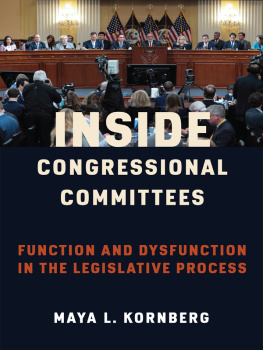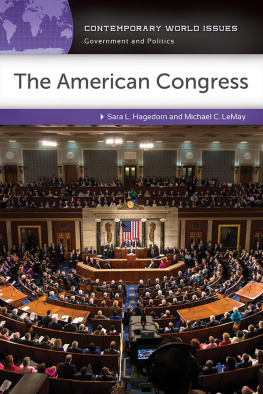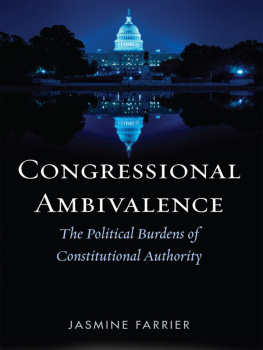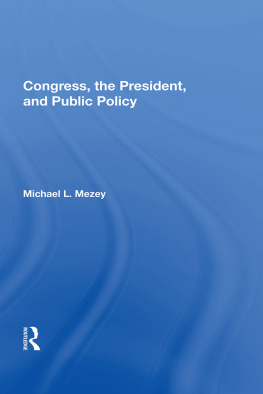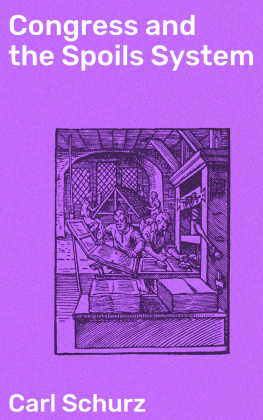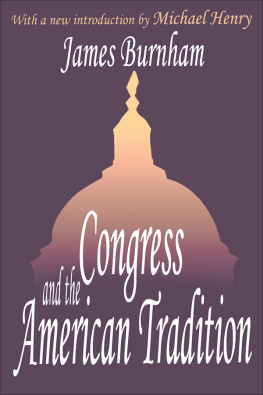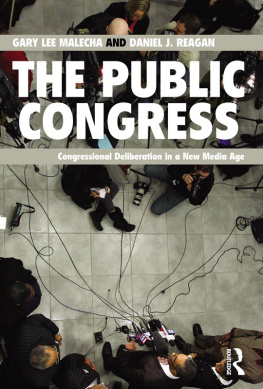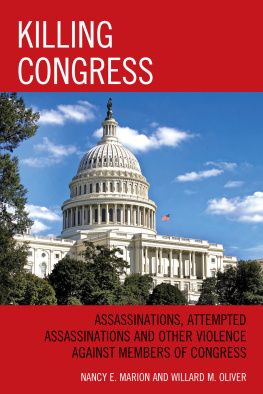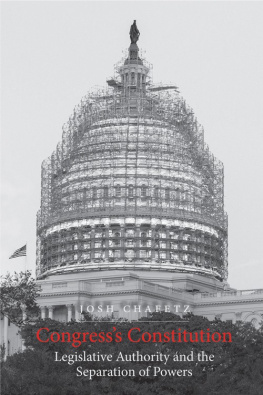The Virtues and Defects of Partisanship and Gridlock
IS CONGRESS BROKEN?
WILLIAM F. CONNELLY JR.
JOHN J. PITNEY JR.
GARY J. SCHMITT
EDITORS
BROOKINGS INSTITUTION PRESS
Washington, D.C.
Copyright 2017
THE BROOKINGS INSTITUTION
1775 Massachusetts Avenue, N.W., Washington, D.C. 20036
www.brookings.edu
All rights reserved. No part of this publication may be reproduced or transmitted in any form or by any means without permission in writing from the Brookings Institution Press.
The Brookings Institution is a private nonprofit organization devoted to research, education, and publication on important issues of domestic and foreign policy. Its principal purpose is to bring the highest quality independent research and analysis to bear on current and emerging policy problems. Interpretations or conclusions in Brookings publications should be understood to be solely those of the authors.
Library of Congress Cataloging-in-Publication data are available.
ISBN 9-780-8157-3036-1 (pbk : alk. paper)
ISBN 9-780-8157-3037-8 (ebook)
9 8 7 6 5 4 3 2 1
Typeset in Adobe Caslon Pro
Composition by Westchester Publishing Services
Contents
WILLIAM F. CONNELLY JR., JOHN J. PITNEY JR., AND GARY J. SCHMITT
DANIEL STID
ANDREW E. BUSCH
Return to Deliberation?
Politics and Lawmaking in Committee and on the Floor
DANIEL J. PALAZZOLO
Changing House Rules
From Level Playing Field to Partisan Tilt
DONALD R. WOLFENSBERGER
MELANIE M. MARLOWE
GARY J. SCHMITT AND REBECCA BURGESS
KATHRYN PEARSON
Ending the Omnibus
Restoring Regular Order in Congressional Appropriations
PETER C. HANSON
Political Realism
How Hacks, Machines, Big Money, and Back-Room Deals Can Strengthen American Democracy
JONATHAN RAUCH
A Return to Madisonian Republicanism
Strengthening the Nations Most Representative Institution
WILLIAM F. CONNELLY JR. AND JOHN J. PITNEY JR.
Introduction
WILLIAM F. CONNELLY JR., JOHN J. PITNEY JR., AND GARY J. SCHMITT
M uch of the contemporary discourse about Congress among scholars, journalists, and politicians has its origins in the writings of Woodrow Wilson and early twentieth-century progressives. These thinkers saw Congress as a roadblock to needed change and ill-adapted to meet the requirements of modern government. Similarly, critics today complain that the constitutional system is not designed for dispatch and is particularly vulnerable to political forces that thwart progress. Congress, they conclude, lies at the center of this dysfunction.
We recognize that all is not well with Congress. But have these Wilsonian expectations intensified disappointment with congressional partisanship and legislative productivity?
No doubt Congress is not as effective as it should be. Problems obviously exist. This volume raises two questions: whether the reforms designed to make Congress more effective have, in fact, done so; and more fundamentally, if the standard by which we judge those reforms is the correct one to begin with. As a constructive alternative, we seek to revive a more traditional Madisonian perspective on Congress. This approach takes a more complex view of the institution, recognizing that there is room for both cooperation and conflict. Yes, the constitutional system is full of friction, as Justice Brandeis wrote, but friction creates light as well as heat. Tough partisan conflict can promote needed oversight, give rise to serious deliberation, and prevent ill-considered legislative innovations. Since Congress is, first and foremost, a representative institution, partisan conflict reflects factional divisions within the polity.
James W. Ceaser gave the opening keynote address at the conference that was the genesis of this volume. Because Congress will never be loved by presidents, he said, it might as well be feared. This fear has been absent in recent years; thus Congress must regain its proper role in the policy process. Congress might, for example, revive the constitutional power of the purse as the best means to defend itself against the overgrown prerogatives of the executive branch. Perhaps Congress needs to revisit the 1974 Budget Impoundment and Control Act, as budgetary process scholar Peter Hanson recommends.
While many of the essays in this volume look back to the Founders for insight into what they saw as the proper functions of Congress, our focus is on the future of Congress. At present, Congress does not deliberate as thoughtfully, legislate as carefully, or oversee the executive branch as thoroughly as it should. Broadly, this collection is an attempt to promote analysis and develop ideas for returning Congress to its proper place in our constitutional system. For successive generations, congressional reforms have been supported as making the institution more open, more responsive, more democratic. As several essays herein suggest, however, the cure for the ills of democratic governance might be, not more openness and more democracy but, rather, a greater respect for the complexity of the institutions and their intended place in producing responsive and sound government. Today, Congress may be better at representing the factional parts of American society and, thereby, less adept at legislating in the interest of the whole. A Congress more Madisonian responsible than Wilsonian responsive may be more effective at fulfilling its other functions to deliberate, legislate, and oversee the executive.
Challenging the conventional wisdom begins with questioning whether Congress is, indeed, hopelessly dysfunctional and whether effective government requires a continued drift toward deference to presidents, courts, and executive bureaucracies. To restore public trust in Congress, we need
Trusting politicians does not mean being nave; it does require, however, not being endlessly cynical about our elected leaders. Madison, after all, was a realist who famously wished to unleash ambition to counteract ambition. He had confidence that politicians, acting within properly established institutions, could produce sound policies. In short, he expected elected representatives to be somewhere between the naivet of Mr. Smith and the cynicism of Frank Underwood.
Madisons design was for a government limited in scope. Expecting a restricted structure to support a government whose ends now seem unlimited is to require that government to perform its role in a way that will inevitably lead the population to frustration, a sense that the system is broken, and distrust of the institutions themselves. A key theme of this volume is that reforms designed to transform the Constitutions architecture have only deepened this problem. Putting a saddle on an elephant does not make the elephant a racehorse. Hence, to regain public trust in government and its institutions, to manage expectations of what Congress was designed to do, we may need to think once again of what it means to have limited government. A fuller appreciation for our system of separated powers, federalism, and bicameralism is a critical, if not simply sufficient, starting point.
In his maiden floor speech first-term Senator Ben Sasse (R-Nebr.), who holds a Ph.D. in history, cited the Founders Constitution and the unique place in the architecture of Madisonian separation of powers served by the Senate. Senator Sasse lamented short-termism and the sound-bite culture in todays Senate, calling for the recovery of more honest Socratic debate. While he offered no magic bullet solutions, Senator Sasse focused on executive overreach and congressional abdication: The growth of the administrative state, the fourth branch of government, is increasingly hollowing out the Article I branch, the legislatureand many in Congress have been complicit in this. Senator Sasse appears concerned that a new president with an ever-expanding policy agenda may make even more aggressive use of executive power than his or her predecessors, making an institutionally stronger Congress more imperative than ever.
Next page

